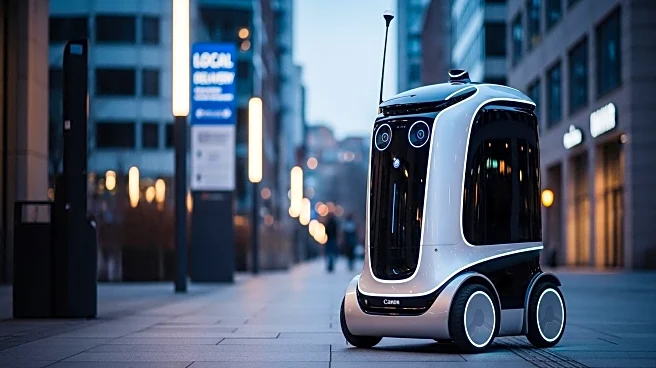What is the story about?
What's Happening?
DoorDash has introduced Dot, its first autonomous delivery robot, designed to operate on bike lanes, roads, sidewalks, and driveways. The robot is part of DoorDash's strategy to integrate human drivers, drones, and autonomous robots to meet increasing delivery demands while reducing costs and emissions. Dot is currently being tested in Tempe and Mesa, Arizona, with plans for broader deployment. The robot is equipped with vision, radar, and lidar sensors, allowing it to travel up to 20 mph. Despite the introduction of Dot, human Dashers will continue to handle most deliveries, focusing on high-value orders that require human judgment.
Why It's Important?
The introduction of Dot represents a significant step in the evolution of delivery services, potentially transforming the logistics industry. By integrating autonomous robots, DoorDash aims to enhance efficiency and reduce operational costs, which could lead to lower prices for consumers. The move also highlights the growing trend of automation in various sectors, raising questions about the future of human labor in delivery services. While DoorDash assures that human Dashers will still play a crucial role, the long-term impact on employment remains uncertain. Additionally, the use of autonomous robots could reduce traffic congestion and emissions, contributing to environmental sustainability.
What's Next?
DoorDash plans to expand Dot's deployment to multiple markets following the initial testing phase in Arizona. The company will likely monitor the robot's performance and gather feedback to refine its operations. As Dot becomes more prevalent, DoorDash may face regulatory challenges and public scrutiny regarding safety and job displacement. The company will need to work closely with local governments and communities to address these concerns. Furthermore, DoorDash's competitors may also accelerate their efforts to develop similar technologies, potentially leading to increased competition in the autonomous delivery space.
Beyond the Headlines
The deployment of Dot could have broader implications beyond the immediate logistics industry. It may influence urban planning and infrastructure development, as cities adapt to accommodate autonomous vehicles. The technology behind Dot, including its sensor suite and AI capabilities, could also spur innovation in other sectors, such as transportation and robotics. Ethically, the shift towards automation raises questions about data privacy and the potential for increased surveillance. As companies like DoorDash continue to innovate, they must navigate these complex issues to ensure responsible and sustainable growth.















